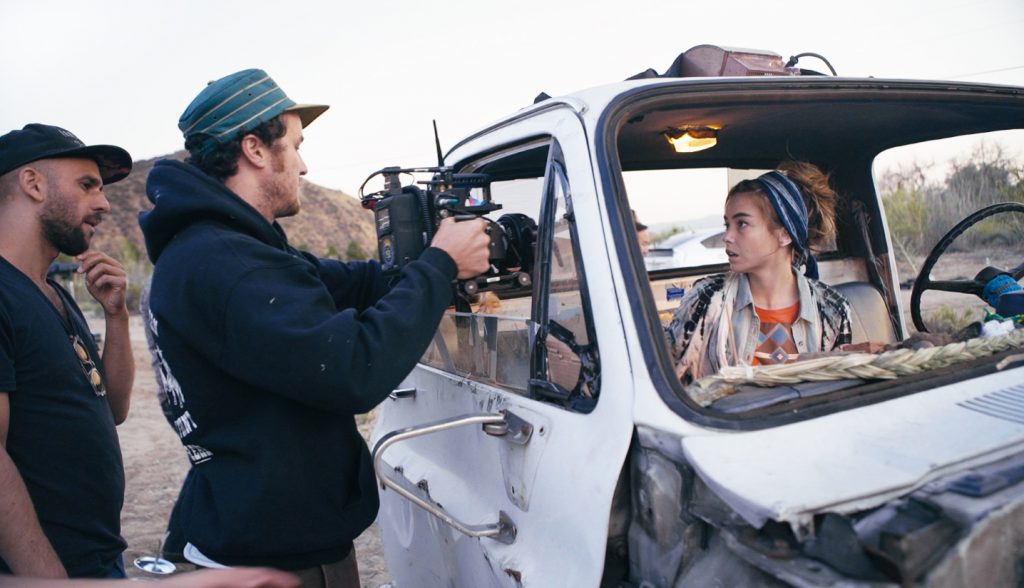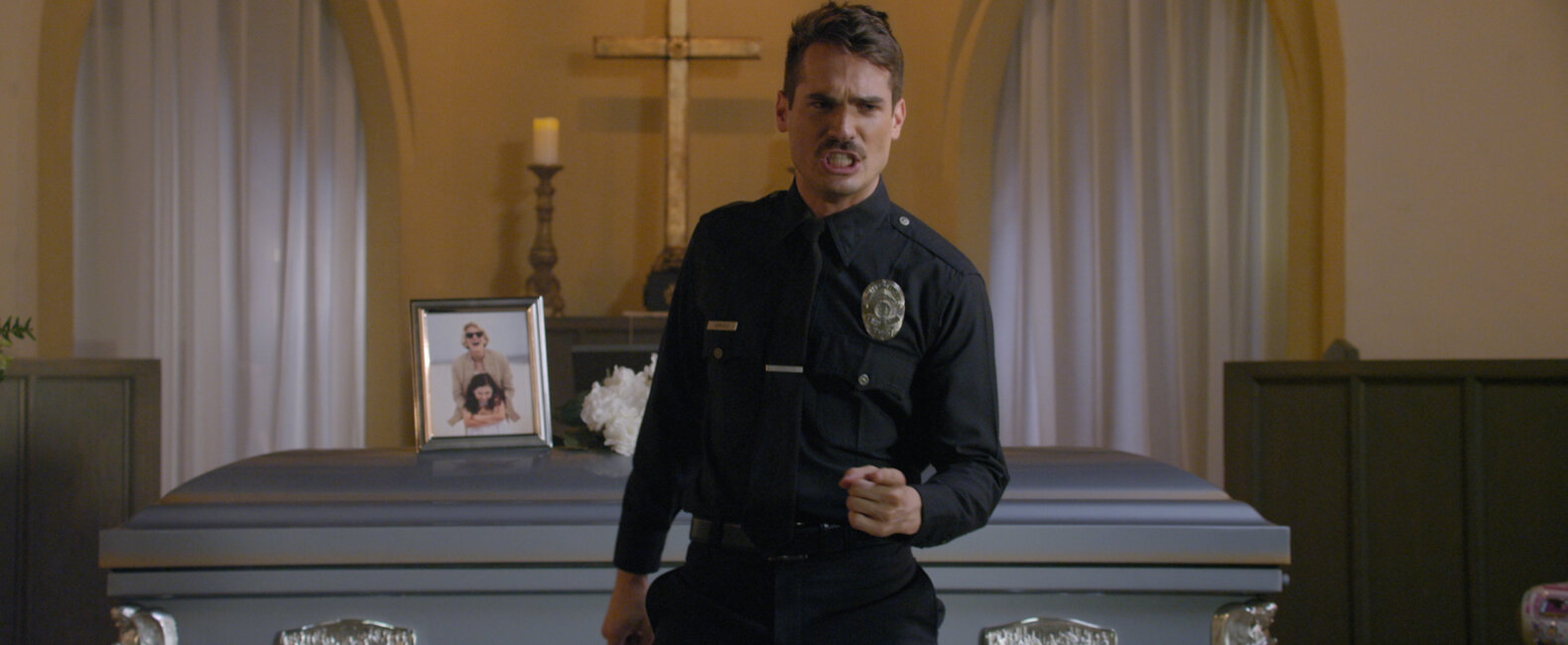In Jim Cummings’ breakout one-take short film, Thunder Road, a heroically unselfconscious police officer (played by Cummings) takes the stage at his mother’s funeral to sing a cringeworthy, albeit gut-punchingly heartfelt, rendition of Springsteen’s classic tune. The film—which would go on to win the Sundance Short Film Grand Jury Prize—not only paved the way for Jim’s career, but it’s something of a metaphor for what Jim’s career is all about: sincerity, vulnerability, and a whole lot of putting yourself out there. “Everybody’s so terrified to do anything,” Jim told us. “So was I. But it takes doing something to do something. Being persistent is what makes you a director.”
In less than two years since Thunder Road’s success, Jim has gone on to direct a half-dozen one-take films for Fullscreen, develop a TV show for FX, and write a feature-length version of Thunder Road, which will have started shooting by the time this interview is published. You might say he’s hit his stride. Or, as Bruce Springsteen said after watching Thunder Road: “the kid’s on a roll.”
Here’s our interview with the incomparable Jim Cummings.

Jim Cummings: I remade The Matrix on my dad’s miniDV camera. It was terrible. So, yah, I’d say I’ve always wanted to make movies.
Musicbed: You went to Emerson?
I went to Emerson College in Boston, yes. It was a good community of people. The Daniels who made Swiss Army Man (Daniel Kwan and Daniel Scheinert) were in my class. Danny Madden. Tony Yacenda. I was always competing with those people at the local film festivals, and I was always getting second place. That’s why I became a producer for the first six years out of college. I didn’t think I was a very good director. I was terrified of doing anything on my own. But I also knew the projects I was producing weren’t that great either. They weren’t connecting with audiences. They weren’t actually funny. You’d watch them and say, “Oh, I get it. It’s funny.” But you wouldn’t really laugh. Same thing with emotional movies. You wouldn’t really feel anything. But then I watched Inside Out, the Pixar film, and I laughed the whole time. I cried when Bing Bong died. And the whole time I was thinking about what it means to be human. It gave me ammunition to cope with these things in my own life. I was like, “I want to make stuff like that.”
But it takes doing something to do something. Being persistent is what makes you a director.
Where did you get the idea for Thunder Road?
In a hot tub. A buddy of mine was telling me about a friend who sang a song at his mom’s funeral. I was like, “What did that sound like? It couldn’t have sounded very good.” He’s probably going to be thinking about a lot of stuff. He’s probably going to be heartbroken. I started thinking about what I would sing at my own mother’s funeral, and I figured I would probably sing “Thunder Road” by Bruce Springsteen. I would sing it, and it would be terrible and humiliating and really funny and honest. That idea became Thunder Road, which we shot in six hours, and which ended up winning at Sundance. That was awesome—except we didn’t have the rights to the song, so we couldn’t put it online. I guess The Boss has never given anybody the rights to the songs on Born to Run. But he ended up watching Thunder Road, and his exact quote (so I’ve heard) was, “The kid’s on a roll.” I was like: “Okay, this is the coolest thing that’s ever happened to me.”
Because of that film, I got a deal with the people at Fullscreen to do six more one-take short films. Then I developed a show for FX called Space. And I wrote a feature version of Thunder Road, which we’re shooting in November 2017. So that’s how I became a director, in a really roundabout way. There was no golden bullet. There’s nothing that actually gets you there. The thing is just doing it. Everybody’s so terrified to do anything. So was I. But it takes doing something to do something. Being persistent is what makes you a director.
After you made Thunder Road, but before the affirmation of Sundance, did you have the sense that, “Okay, I’ve found a voice that feels like me”?
So… no. I get that question from film students a lot. They’ll say, “When did you find your style?” And I say, “I have a style?” I think I have a tone. It’s funny and also sad. That’s it. That’s the only thing that makes it me: the things I find funny, and the things I find sad. And the style, the long takes—that’s just theater. People say, “Oh my god, you memorized 13 minutes of dialogue. It’s amazing.” I’m like, “Have you never been to a play?”
How do you balance the funny and the sad?
With Thunder Road, for example, the DNA of the project was to withhold the genre from the audience, so they were never sure if it was a drama or a comedy. And a lot of that actually came down to color correction. We had it look as bland as possible. If we filtered it too green, it looked like The Bourne Identity, which might cue the audience that this is a drama. But if we went too bright with it, it looked like a Judd Apatow comedy. We went for the middle ground so people would be confused.
Was it hard to replicate your enthusiasm for Thunder Road when you were commissioned to make six more?
Fuck no. The great thing was, I got to bring in all these amazing people I’d always wanted to work with as actors: Annie Hamilton. PJ McCabe. Rae Gray! It was so much fun to bully them into these pressure-cooker situations. All of my movies are just: How do I make this harder on the actor? How do I have so many plates in the air that these poor people have to juggle, that the audience is left wondering, “How the hell did they do that?!” I think that’s the only style I have.
You mentioned setting up pressure-cooker situations. What else constitutes a good scenario for a short film?
My buddy Dustin Hahn and I came up with all the scenarios on our drive out to Sundance the first year. We asked ourselves what the most socially and culturally significant subjects were. We knew we wanted to do a native story. We wanted to do something about mental illness. We wanted to do something about the education system. Then we said: What are the 10 to 15 most important minutes in these characters’ lives? We thought those minutes would probably be worth making a film about. I see too many short films and movies that flounder without being important. It’s like, Why do I care about this? But if you make it about an incredibly dramatic human experience, I think that’s interesting to watch; and it’s a valuable experience for an audience.

You’ve hinted a couple times about films being of service to the audience. Is that something you think about in all of your work?
I think so. I will say this: In Toy Story 3 there’s this great scene where all is lost and they’re going down into the inferno. All the toys are getting burned up. It’s this incredible allegory, I think, for the mounting existential dread everyone feels about not being on the planet anymore, at some point. There’s no way for the toys to get out. So they all look at each other, and then they hold hands. It’s this beautiful story of what happens when all is lost. It’s all right because we’re still together. I do think that’s a big part of why I make films. That might be why we’re all here: to help everybody get through this thing, whatever it is. To quote Kurt Vonnegut.
Vonnegut, you say.
[Jim Cummings and interviewer embark on long Vonnegut tangent.]
Last question: What’s the most important thing to remember as a filmmaker?
I always go back to Mark Duplass’s keynote speech from South by Southwest in 2015. He said, “Make the movies you can make right now. The cavalry isn’t coming.” I think that’s the most important thing you can tell a filmmaker. The cavalry isn’t coming. You’ve got to do this yourself. If you’re going to make a movie, imagine that nobody is going to help you. As soon as you start thinking like that—as soon as you tell yourself, Okay, cool. I’m going to have to do everything.—that’s the moment you’re ready to make something.

















































































